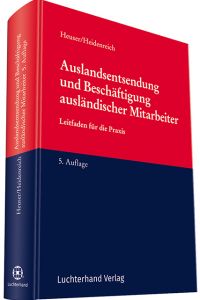The attorneys and tax consultants of HEUSER RECHT UND STEUERN specialize in drafting and handling international employee transfer. Their expertise covers 150 countries.
The firm's professional competence in this field results from the various experiences of its lawyers in business and administration.
Achim Heuser has attracted attention with several publications, such as: 'Foreign Assignment and Employment of Foreign Workers', 'Foreign Assignment of German Employees', 'The Professional Drafting of Assignment Contracts', and 'Expats in China' etc.
Since 1993, Achim Heuser is a lecturer on these topics at congresses, conventions and seminars frequently.
The firm advises german companies which delegate employees abroad as well as non-German companies that want to send staff to Germany.
We also provide so-called Third Country Nationals with the special services and consulting they need.
The collaboration and partnership with experts on fields apart from human resources and law allows us to develop individual one-stop solutions for our clients.
Our colleagues are multi-lingual and qualified.
The communication process between firm and client is reliable and efficient considering time management. The use of state-of-the-art technologies ensures a personal and individual interchange.
The high standards we set ourselves are reflected in a continious controlling. Our clients gain a significant relief.
Our services:


